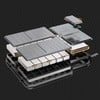Plastic and Rubber Balls
(62 companies)
Plastic and rubber balls are rolling, spherical elements that have low friction values and require little or no lubrication. They are lighter than metal balls and resistant corrosion and abrasion. Some plastic balls resist high temperatures, but others do not. Rubber balls are characterized by a high degree of flexibility and elasticity.
Plastic Mold Equipment Design and Fabrication
(78 companies)
Plastic mold equipment design and plastic mold equipment fabrication services specialize in the design and fabrication of machinery used to create plastic molds, barrels or cylinders, liners, hot runner systems and component, and feeders.
Plastic Machining Services
(466 companies)
Plastic machining services fashion or fabricate parts and components out of various plastic and thermoplastic materials.
Plastic Fabrication Services
(491 companies)
Plastic fabrication services provide custom machining, bending, forming and assembly of plastic parts. Companies may use any of several types of joining techniques in assembly such as fasteners, welding and gluing.
Plastic Extrusion Services
(326 companies)
Plastic extrusion services suppliers specialize in extruding plastics and polymer compounds into custom and standard profiles and shapes.
Plastic Media and Abrasives
(88 companies)
Plastic media and abrasives are used in blasting, tumbling, and other finishing processes. Plastic blast media allows removal of paints or organic coating without abrading the underlying metal substrate.
Plastic Welding and Assembly Equipment
(110 companies)
Plastic welders consist of torches, ultrasonic welding equipment, heat guns, hot rod welders, RF or dielectric welders, and hot plate welders used to join thermoplastic materials.
Plastic Molding Services
(2,502 companies)
Plastic molding services use a number of different molding techniques to produce components, including thermoplastic and thermoset injection molding, blow molding (includes injection blow molding), rotational molding, thermoforming, structural foam molding, compression molding, resin transfer molding (RTM), and others.
Polymer and Plastic Composites
(355 companies)
Polymer and plastic composites are strengthened with fibers, fillers, particulates, powders and other matrix reinforcements to provide improved strength and/or stiffness. Examples include fiber reinforced plastics (FRPs), sheet molding compounds (SMCs), bulk molding compounds (BMCs), pre-preg materials, and fabricated composite parts.
Polymers and Plastic Resins
(869 companies)
Polymers and plastic materials are organic, synthetic or processed polymers that are supplied as raw materials. They typically consist of thermoplastic or thermosetting resins in the form of pellets, powders or liquid resins. These materials can then be molded into a variety of shapes for a wide range of uses.
Plastic Plate, Rod, and Stock Shapes
(418 companies)
Plastic plate, rod and stock shapes include shaped plastic parts and plastic stock. They are fabricated through various processes and available in many different forms and sizes.
Fabricated Plastic Parts and Semi-Finished Shapes
(369 companies)
Fabricated plastic parts and semi-finished shapes include molded, cast, extruded and machined parts made from any polymeric materials. They are supplied as bars, films, plates, profiles, rods and shims.
Test Tubes
(140 companies)
Test tubes are handheld tubes are used for mixing or heating chemicals in a laboratory. They are open at the top and rounded at the bottom, and usually made of glass or plastic materials
Burettes
(68 companies)
Burettes are tall cylindrical graduated cylinders, open at the top with a tap or stopcock at the bottom used for precisely dispensing liquids How to Select Burettes. Image Credits: U.S. Plastic Corporation and Small Parts, Inc. Burettes are used...
Push-in Rivets
(26 companies)
Push-in rivets are cylindrical, headed, usually plastic fasteners that are pushed or pressed into place to secure two or more items together.


